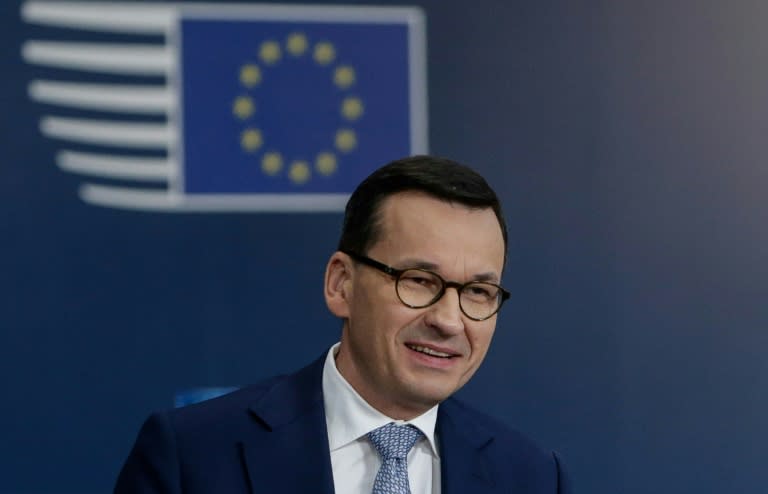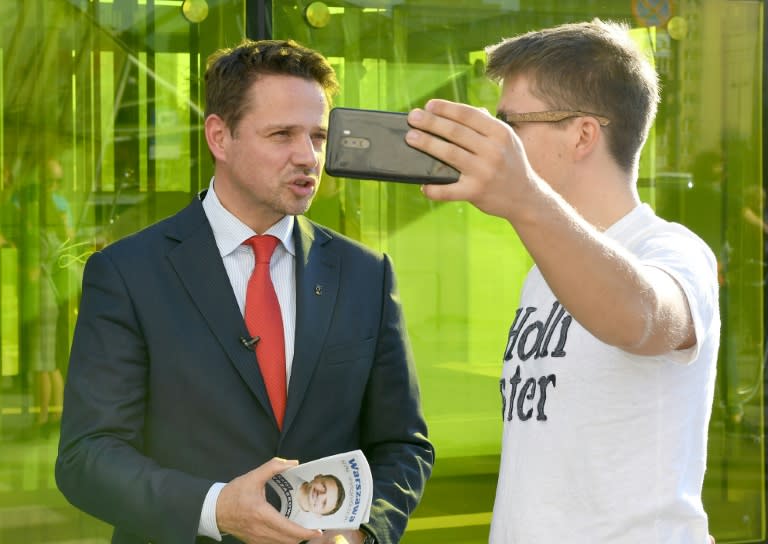Poland's nationalists face key test in local election
Poles vote Sunday in local elections seen as a key test for the country's controversial nationalist governing party as it gears up for EU and legislative elections next year. Since winning an unprecedented majority in 2015, the Law and Justice (PiS) party has been on a collision course with the EU over a series of judicial reforms that critics say pose a threat to democracy. The PiS insists however that the reforms tackle corruption and overhaul a judicial system still haunted by Poland's communist era. "The elections are a test for the major parties in large cities and regional councils ahead of the European elections (in May) and next year's parliamentary elections," Stanislaw Mocek, a political scientist with Poland's Academy of Sciences, told AFP. Riding a wave of popularity driven by robust economic growth and generous social spending, the PiS stands to make gains in regional councils but is unlikely to dominate them. Despite coming out on top in a poll published on Friday by the SuperExpress tabloid daily, the results suggest PiS would win an average 34 percent of the vote in the local councils -- but not enough to govern alone in any of the regions. The survey was conducted on a regional basis by the Pollster agency Wednesday and Thursday on a random sample of 1,086. It also registered 24 percent voter support for a liberal and centrist coalition and 12 percent support for independents. PiS voters see the party, especially its leader Jaroslaw Kaczynski, as a brave defender of national interests. - Clash with Brussels - But critics of the PiS's disputed judicial reforms insist they are unconstitutional and pose the greatest threat to democracy in Poland since it shed communism. Recent polls also suggest that the PiS has a slim chance of winning in cities during two rounds of voting that starts this Sunday and ends on November 4. Senior PiS figures such as Kaczynski and Prime Minister Mateusz Morawiecki have travelled the country in recent weeks to bolster local candidates. Younger PiS politicians Patryk Jaki and Malgorzata Wasserman are leading the charge against liberal and left-leaning candidates in the capital Warsaw and in Krakow. Jaki, just 33, is currently Poland's deputy justice minister. His campaign for an "honest and ambitious Warsaw" targets outgoing liberal Mayor Hanna Gronkiewicz-Waltz, who has been dogged by allegations of corruption in the reprivatisation of Warsaw properties confiscated by the communist regime after World War II. He is running against liberal Rafal Trzaskowski, a 46-year-old former minister and MEP campaigning for a "Warsaw for all" in a bid to counter the polarising PiS rhetoric. Polls published this week show Traszkowski beating Jaki in the November 4 run-off by over ten percent of the vote. Opposition politicians accused the PiS this week of using scare tactics after it ran a campaign ad insisting that Civic Platform, if its candidates won, would allow an influx of migrants and refugees. Jaki, who has acknowledged that he is trailing in the polls in the Warsaw race, defended the video. "I've visited the West, and I don't want something to blow up here as has been the case in many other cities," he told Poland's commercial RMF radio station. "If you elect Trzaskowski, you have no guarantee that this won't happen." Trzaskowski, for his part, promises to continue an urban development drive launched by Gronkiewicz-Waltz that brought new roads, metro lines, bicycle paths and spruced up recreational areas. In Krakow, Wasserman trails long-serving incumbent Mayor Jacek Majchrowski by more than ten percent, according to several polls. - Rural battle - In the countryside, the PiS is struggling to pull ahead of the Polish Peasants' Party (PSL), a group that has dominated rural areas for decades. The stakes are high: local authorities play a key role in the distribution of EU farm subsidies and regional development funds for long-neglected rural areas. Experts believe that Kaczynski can count on the support of the powerful Catholic church to convince traditionally religious rural voters to back the conservative PiS. Polling stations are open from 0500 GMT to 1900 GMT on Sunday, with a run-off vote due on November 4 in cities and towns where no single mayoral candidate wins an absolute majority.



